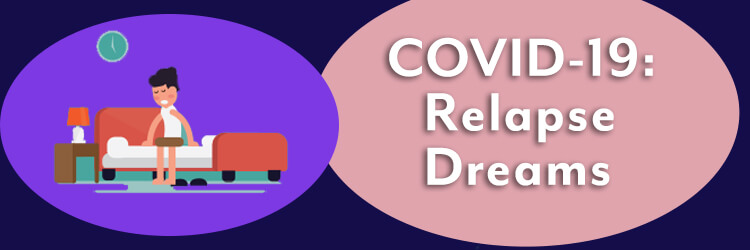[vc_row][vc_column][vc_column_text]I’ve been drinking, a lot. I say to anyone who will listen: “I’m sober; I’m just drinking tonight.” But I have a sinking realization: my whole sobriety has been false.
In the nearly five years since I’ve been sober, I’ve had versions of this dream every couple of months. I invariably wake up upset, then relieved. The dream stays with me until the afternoon or evening.
Lately I’ve seen articles about pandemic-related anxiety dreams. I’m apparently one of many who has nightmares about viruses or virus metaphors. But I’ve also had relapse dreams at least once a week. And from what I’ve heard in sober communities, I’m not alone in this, either.
I’m not surprised. Recovery is a huge part of sober people’s lives. We’ve worked hard on it. It makes sense that backsliding would be anxiety dream material. Since the pandemic began, the Lyon Neuroscience Research Center has found a 15% increase in negative dreams. According to the National Geographic, those not on the frontlines are dreaming in metaphor about the virus. Creatures like zombies and bugs have been on people’s dreaming minds.
Relapse dreams are a different kind of anxiety metaphor. Especially now, as the pandemic negatively affects our lives, we may be reminded of substances. Drinking or using negatively impacted our lives. The period right before recovery may have been the last time before the pandemic we were in a major crisis. On some level, we may also be craving alcohol or drugs more. At a time of crisis, people crave the substances they previously relied on to cope.
The good news is that relapse dreams by themselves are nothing to worry about. Robert Mendelsohn, a psychoanalyst who has been in practice over 45 years (and also my dad!), says dreams like that are about mastering the craving. In waking life, we can employ coping skills. In our dreams, it’s safer to act out the craving. That way we can work through it. One study in the American Journal of Psychiatry found that people with Alcohol Use Disorder who had drinking dreams were more likely to stay sober. The connection was so strong that the authors of the study called drinking dreams a “good prognostic sign.”
Researchers believe people’s response to the dream is more important than the dream’s content. For instance, if you are upset by the dream and relieved it isn’t true, you’re less likely to relapse. But if you wake up nostalgic for the substance or wish you could go back to dreaming about it, that may be a sign of something more insidious. That’s still no reason to panic; it just means it’s a good idea to double down on your coping skills and recovery.
After having frequent and largely similar relapse dreams since the pandemic, I recently had a different one. It started out the same: I was drinking a lot, telling everyone I was sober but drinking tonight, then hit with that sinking realization. But right after having the realization, I thought, “I only think that when I’m dreaming.” I continued to dream for a bit after that, but with the in-dream knowledge that I was only relapsing because I was dreaming.
It would be a neat ending to say that this “solved” my relapse dreams and I stopped having them. But I’ve had a few relapse dreams since then that I didn’t realize were dreams until I woke up. Progress is rarely linear, and cravings rarely disappear entirely. But I’m hoping the lucid dream means a sort of progress—a sign that I’m both working through COVID anxiety and making breakthroughs in recovery. If you are having frequent relapse dreams during this crisis, you are working through something important. And you are definitely not alone.
That said, if you think the dreams mean something more, there is help available. TruHealing Centers is open throughout the pandemic, with hospital-grade sanitization and telehealth options so that you can feel safe in treatment. At our facilities across the country, we provide high-quality treatment for substance use and mental health disorders. We will give you the tools to thrive in long-term recovery. Call an admissions specialist at 410-593-0005.[/vc_column_text][/vc_column][/vc_row]









